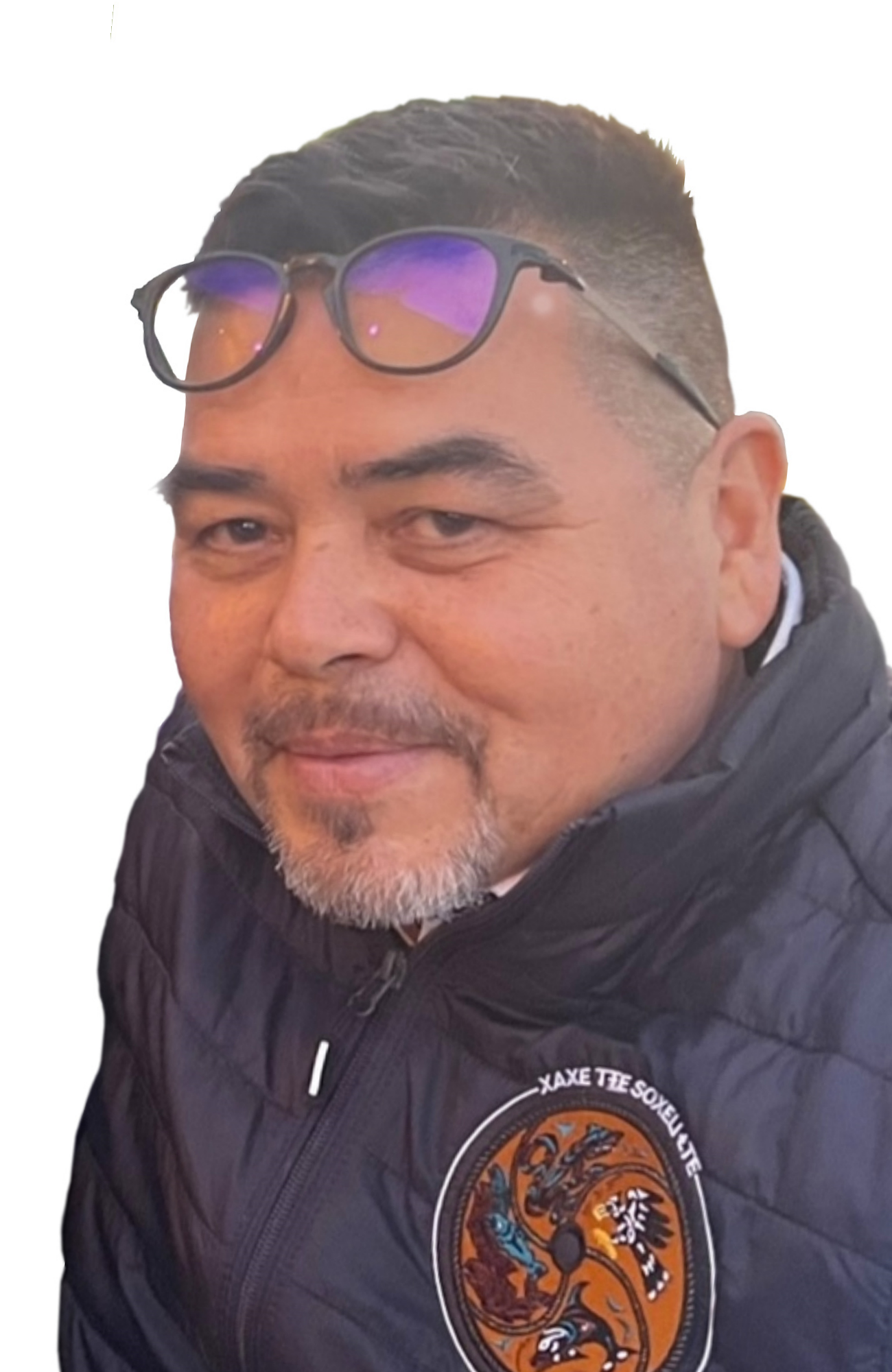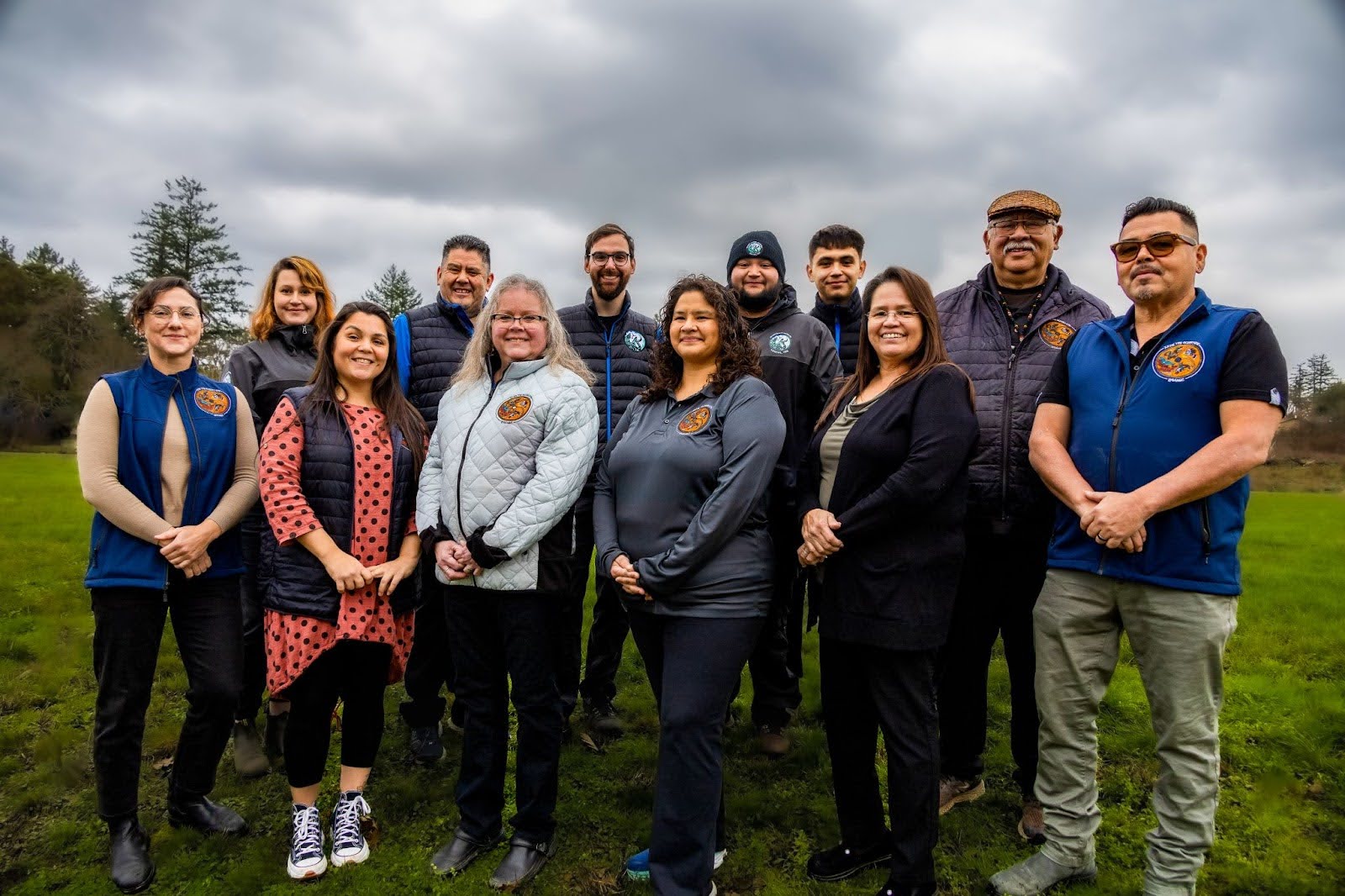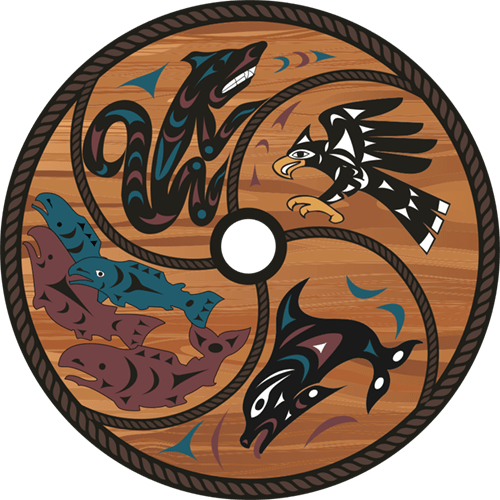OUR TEAM

Gordon Elliott, Director of Operations, Co-Founder
Gord comes to the WLC with many facets of management experience and training. Gord worked as the Operations Manager at the W̱SÁNEĆ School Board for the past 30 years, and he also has Project and Construction Management experience and certifications. Prior to its incorporation, Gord worked as the WLC’s Coordinator. Once the WLC incorporated, Gord was appointed the Director of Operations. He has been an active elected Councilor for Tsartlip First Nation for the past twelve years.
“I am the master of nothing, but I am an expert of getting the right people together to discuss and solve issues” – GE

Eric Pelkey, Community Engagement Coordinator
Eric Pelkey brings 25 years experience working in First Nations administration. During his career, he has held the roles of Band Manager, Chief Executive Officer, Director of Operations as well as Lands Manager.
Additionally, Eric was Coordinator for the SENĆOŦEN Alliance, representing Tsawout, Tsartlip, Pauquachin and Semiahmoo Nations on common Aboriginal and Douglas Treaty Rights and Title issues, a position he held for four years.
In addition to his administrative roles, he holds certification from AANDC for First Nations Lands Manager, a lifetime appointment for Commissioner of Oaths and Affidavits for First Nations, and a Degree in Indigenous Language Revitalization from the University of Victoria.

Joni Olsen, Policy/Negotiations Manager
Joni Olsen is a Policy/Negotiations Manager for the W̱SÁNEĆ Leadership Council. She strongly believes in the principles and values of the W̱SÁNEĆ culture, in Indigenous Rights and Title, their Treaties and working towards implementation and structural change.
Joni served as an elected Councillor for the Tsartlip First Nation for 14 years and has a Major from the University of Victoria in Political Science and a double Minor in Indigenous and Environmental Studies, along with a Master’s degree in Public Administration. Her goal is to create structural change in government, organizations, communities and society. She is working on creating policies and building relationships that are guided by W̱SÁNEĆ values, that educate, create opportunity and remove barriers, and that fundamentally change the system in which we live. Joni’s favourite part of her work is listening to the words of the W̱SÁNEĆ people and taking it to create new policy and design new opportunities. Although this is followed by difficult, slow negotiations, this challenge is her other favourite aspect.
Joni is a mother to three teenagers and loves learning, cooking, hiking, playing soccer, knitting, teaching, talking with people and dreaming big.

Shauna Johnson, Marine Use Planner
Shauna Johnson is Coast Salish from the Tsawout First Nation on her mother’s side and Tsimshian from Laxkwala’ams on her father’s side. She has a Master of Science degree in Indigenous Community Planning (ICP) and has specialized expertise in providing planning support for indigenous communities to revitalize and promote indigenous community planning research, methods and practices grounded firmly within indigenous laws, legal traditions and ways of knowing and being. She is currently working towards becoming a Registered Professional Planner (MIP, RPP). She has experience working with indigenous communities on housing strategies, comprehensive community plans (CPP), strategic land use (reserve based, and watershed level based), environmental management, marine spatial/use plans (MSP/MUP), economic development plans and indigenous food systems projects. She is also an adjunct professor at University of British Columbia (UBC) in the School of Community of Regional Planning (SCARP) Indigenous Community Planning (ICP) program, mentoring, supervising and co-teaching ICP practicum students.

David Dick, SRKW Monitoring Program Senior Manager
David, also know by his traditional name as SUMÉ,t, is from the Songhees Nation. He has deep roots throughout the W̱SÁNEĆ communities and the west coast of Vancouver Island (through Klahoose and Ditidaht First Nation) along with his family roots in Switzerland and Norway.
David’s education background is a Bachelor of Arts with a Major in First Nations Studies from Vancouver Island University, a Certificate in Indigenous Governance and Leadership along with a diploma in Cultural Resource Management from the University of Victoria
David comes with extensive federal government experience. He worked for 12 years with Parks Canada as the Gulf Islands National Park Reserve Cultural Program Assistant and First Nations Liaison. Additionally, David has immeasurable managerial skills through the potential development of a culture centre and work through Pauquachin First Nation as the Manager of the Marine Department.
David believes in his role as the SRKW Senior Manager: “It’s better to have our Guardians out there whose intentions on the waters are based on Indigenous caretaker values and supported by science, versus financial interests”.

Laurie Whitehead, Referrals Manager
Laurie is the Referrals Manager for the W̱SÁNEĆ Leadership Council. She has a Master of Applied Science in Resource and Environmental Management, and 25 years of experience working for First Nations governments. She has expertise in policy analysis and development, and consultation and accommodation in relation to Aboriginal rights and title.
Over the 2021-2023 period she has facilitated establishment of a W̱SÁNEĆ Referrals Program and an Archaeology Program. Under the Referrals umbrella we allocate time to projects that WLC member First Nations delegate to WLC. Projects include: 1) Highway 1 Goldstream Park Median Barrier and Road Work Project; 2) Joint Utility Board Sewage Treatment Plant Outfall Relocation Project; 3) CRD Parks Strategic Plan 2022-2032 Update; 4) Providing input on the CRD Mount Work Regional Park Management Plan. We draw on a Referrals Committee and the W̱SÁNEĆ Technical Advisory Committee for these projects, and make an effort to get the word out to W̱SÁNEĆ people to explain projects and to listen and integrate input into recommendations to decision-makers.
For the Archaeology Program we established an Archaeology Committee and implement agreements including the Land Altering Works Protocol Agreement that WLC negotiated with the CRD, the WLC/District of Saanich ÁTOL,NEUEL (“Respecting One Another”) Memorandum of Understanding, and monitoring in the Gulf Islands National Park Reserve. We have been working on policies and procedures, and bring recommendations to the WLC Board in response to cultural heritage-related activities proposed for W̱SÁNEĆ territory. The Archaeology Committee initiated a Protocol Agreement to guide a Canada Food Inspection Agency development, training and capacity building programs for cultural workers / archaeological monitors, and a fee for service program.

Marla Sampson, Office Manager
Marla has many years of experience supporting programs and people in a variety of private and public roles, most recently as a Program Assistant at UVIC. Along with her in-depth knowledge and experience in Indigenous protocols and culture, Marla also brings strong financial, process, and people-oriented skills to the WLC. Marla is a lifelong learner, having obtained numerous courses and certificates, including her Aboriginal Health Care Administrators Program.
Marla is currently working on completing her Diploma in Business Administration.

Eryn Rogers, Policy and Negotiation Analyst
Eryn Rogers is a Policy and Negotiation Analyst for the W̱SÁNEĆ Leadership Council. She moved to Canada from Aotearoa/New Zealand in mid-2022 and is looking forward to working for W̱SÁNEĆ peoples at these important Tables.
For the past six years, Eryn has worked in Tiriti o Waitangi/Treaty of Waitangi settlement negotiations in Aotearoa. Most recently, she acted as the Negotiation and Settlement Manager for the Ngāti Maru Negotiations and the Taranaki Maunga negotiations. Before that, she studied Law and Pacific Studies at the University of Otago.
As a Policy and Negotiation Analyst for the Leadership Council, Eryn wants to help establish durable partnerships with neighboring First Nations, the Crown and other local stakeholders in a way that will benefit W̱SÁNEĆ peoples, restore respect for W̱SÁNEĆ knowledge and traditions, and provide flexibility for growth over time.

ĆILTEN (Phil Tom), Knowledge Weaver
ĆILTEN (Phil) is from the Tsartlip First Nation, where he has lived his entire life. A father of four and a grandfather, he comes from the Tom and Bartleman family in Tsartlip.
As the Knowledge Weaver with the W̱SÁNEĆ Leadership Council, he is involved in revitalizing clam gardens in the Gulf Islands, including Salt Spring Island and Fulford Harbour. Working alongside Parks Canada and community members, he helps restore these traditional sites, ensuring the sustainability of sea life and reclaiming Indigenous stewardship of the land.
Phil’s passion for this work stems from his upbringing, where clams and shellfish were a central part of life. He hopes to see the project grow into a self-sustaining initiative, supporting both community food security and economic opportunities.
Outside of work, he enjoys spending time with his family and being outdoors. He believes reconnecting with these historical sites honors W̱SÁNEĆ ancestors and traditions.

Nicole Joe, Administrative Assistant
Nicole Joe is a member of the Cowichan Tribes and grew up in the Tsawout territory, where her grandmother and mother are from. Her late father was from Cowichan, and she remains deeply connected to both communities.
As the Administrative Assistant at the W̱SÁNEĆ Leadership Council, Nicole supports the team in their daily operations. She brings experience in administration, social development, and office management, and she is excited to contribute to a welcoming and positive work environment.
Her passion for the work aligns with her cultural values, instilled by her parents and grandparents. She hopes to support W̱LC’s initiatives in a meaningful way, ensuring the team’s efforts continue to grow.

Ned Taylor, Local Government Program Manager
Ned was born and raised in W̱SÁNEĆ and lək ̓ ʷəŋən territory and has spent his entire life here. A graduate of Reynolds Secondary School (2017), he describes himself as outgoing and passionate, valuing both time with people and moments of solitude. He approaches everything he does—whether work, hobbies, or personal growth—with full dedication and energy.
As W̱SÁNEĆ Leadership Council’s Local Government Program Manager, Ned will focus on strengthening relationships with local governments, including the CRD, the District of Saanich, and the Islands Trust. His work will involve supporting WLC’s engagement in these spaces and helping advance W̱SÁNEĆ priorities through collaboration and advocacy.
With four years of experience in local government—including serving on Saanich Council and the CRD Board—Ned brings valuable leadership and policy expertise. He’s eager to contribute meaningfully to WLC’s work while deepening his understanding of W̱SÁNEĆ history and governance.

Marissa Jim, Junior Marine and Land Use Planner
Marissa, whose ancestral name is I¸MIUW̱, is W̱SÁNEĆ and Penelakut with ties to Ditidaht. She feels privileged to have lived in both of her territories and currently resides in W̱S͸ḴEM. As a mother of two boys and a dog owner, she finds peace on the land and by the water. Deeply rooted in her culture, Marissa is dedicated to serving her people and strengthening her community.
As WLC’s Junior Marine and Land Use Planner, she works alongside Shauna Johnson to engage the community in planning for the future. Her role involves organizing engagement sessions, gathering community input, and ensuring W̱SÁNEĆ voices guide land and marine use planning. She also participates in discussions on territorial matters, aiming to bring her people’s aspirations to life.
With a background in Indigenous studies, anthropology, and archaeology, Marissa has worked as a Marine and Land Use Researcher and in BC’s Aboriginal Doula Program. She values cultural protocols and is committed to preserving and uplifting community knowledge.

Shantelle Voyageur, Women’s Coordinator
Shantelle Voyageur is from Victoria, BC. Her late father, Carl Wamiss, was from Kingcome Inlet, Musgamagw Dzawada’enuxw, and her mother, Judy Henry, is from Pauquachin First Nation, W̱SÁNEĆ.
As the new Women’s Coordinator, Shantelle is dedicated to creating spaces where women can gather, share meals, stories, history, and language, and support one another—especially after the challenges of COVID. She aims to focus on mental health and wellness, fostering connection and empowerment through meaningful programs and events.
She brings experience in coordinating and facilitating community gatherings, having worked on the Comprehensive Community Planning (CCP) for Pauquachin and as a summer program supervisor for youth. Her personal journey with mental health makes this role especially important to her, as she hopes to inspire women to step out of their comfort zones and reconnect with one another.
When she’s not working, Shantelle enjoys spending time with her nieces and nephews and relaxing at home by the waterfront in Sidney. She’s looking forward to bringing women together and strengthening community bonds through her work.

Ethan Cire, Communications Coordinator
Originally from Treaty 6 territory (Alberta), Ethan is Cree-Métis and recently moved to Victoria with his wife—embracing the philosophy that there’s “no time like the present.” His mother is Cree, and his father is of Hungarian descent.
As the Communications Coordinator for the W̱SÁNEĆ Leadership Council and IMB Secretariat, Ethan serves as the key connection between the IMB and 11 First Nations. His role is to ensure clear, accessible communication, making sure vital information reaches each nation effectively.
With a BA in Film and a minor in English, he brings a strong background in media and content creation to this role. He previously worked as an Indigenous Student Liaison at Wilfrid Laurier University and hopes to eventually pursue a master’s in Communications. His experience in film production will play a crucial role in making governance information more digestible and accessible for all.
His goal is to open up dialogue, ensuring that communities not only receive information but can truly engage with it—thinking critically, understanding it fully, and working together toward collective goals. He’s passionate about leveraging modern technology to simplify and enhance communication between nations.
W̱SÁNEĆ LEADERSHIP COUNCIL EXECUTIVE

Chief Harvey Underwood, Director, Co-Founder
Chief Tanya Jimmy, Director / Secretary, Co-Founder
Councillor Simon Smith, Tsartlip Rep, Co-Founder
Councillor Brian Jimmy, Tseycum Rep
Councillor John Etzel, Tsawout Rep
Chief Harvey Underwood, Director / Treasurer, Co-Founder
COMMITTEES
COMMITTEE MEMBERS
John Elliott
Simon Smith
Stanley Sam
BACKGROUND
COMMITTEE MEMBERS
Robert Clifford
Nick Claxton
William Morris
Dr. Peter Evans
John Elliott
Eric Pelkey
Gord Elliott
Katelyn Beale
Joni Olsen
COMMITTEE MEMBERS
Ashley Cooper
Beangka Elliott
Earl Claxton Jr.
John Bradley Williams
COMMITTEE MEMBERS
Charles Elliott
Doug Lafortune
Mark Henry
James Jimmy
COMMITTEE MEMBERS
Youth Committee information to be added.



